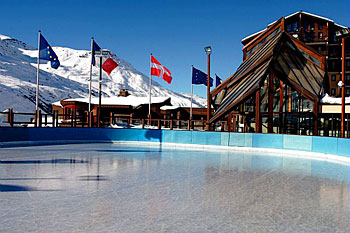

 |
The Second International Conference on Advances in Databases, Knowledge, and Data Applications DBKDA 2010 April 11-16, 2010 - Menuires, The Three Valleys, |
|||
|
||||
| Call for Papers |
Advances in different technologies and domains related to databases triggered substantial improvements for content processing, information indexing, and data, process and knowledge mining. The push came from Web services, artificial intelligence, and agent technologies, as well as from the generalization of the XML adoption.
High-speed communications and computations, large storage capacities, and load-balancing for distributed databases access allow new approaches for content processing with incomplete patterns, advanced ranking algorithms and advanced indexing methods.
Evolution on e-business, ehealth and telemedicine, bioinformatics, finance and marketing, geographical positioning systems put pressure on database communities to push the ‘de facto’ methods to support new requirements in terms of scalability, privacy, performance, indexing, and heterogeneity of both content and technology.
The Second International Conference on Advances in Databases, Knowledge, and Data Applications, DBKDA 2010, continues a series of international events covering a large spectrum of topics related to advances in fundamentals on databases, evolution of relation between databases and other domains, data base technologies and content processing, as well as specifics in applications domains databases.
We welcome technical papers presenting research and practical results, position papers addressing the pros and cons of specific proposals, such as those being discussed in the standard fora or in industry consortia, survey papers addressing the key problems and solutions on any of the above topics short papers on work in progress, and panel proposals.
The topics suggested by the conference can be discussed in term of concepts, state of the art, research, standards, implementations, running experiments, applications, and industrial case studies. Authors are invited to submit complete unpublished papers, which are not under review in any other conference or journal in the following, but not limited to, topic areas. All tracks are open to both research and industry contributions.
Advances in fundamentals on databases
Foundations and architectures
Design features (data quality, performance, robustness, scalability, security, privacy, parallel and distributed approaches, mobility, etc.)
Data quality, data structures, and data modeling
Advanced indexing methods
Advanced ranking algorithms and uncertainty
Physical organization and performance
Federated choreographies
Temporal conformance
Evolutionary clustering and dynamic hierarchical clustering
Databases and other domains
Leading-edge database technology and applications
Heterogeneous databases interoperability and mediation
Databases and Web services
Databases and artificial intelligence
Databases and agents
Advances in database management systems
Advanced transaction and workflow management
Advances on XML and databases
Databases technologies
Self-managing databases
Mobile databases
Database access
Embedded databases
Very large scale databases
Spatial and spatio-temporal databases
Data warehousing
Multimedia databases
Semantic databases
Data integration resources on the Internet
Object-oriented databases
Web-based databases
Deductive and active databases
Databases content processing
Mining for complex data
Mining for text, video, and pictures
Knowledge discovery and classification
Process mining
Scalable data extraction
Query processing and optimization
Query rewrite rules
Navigational path expressions
Load-balancing in accessing distributed databases
Incompleteness, inconsistency, uncertainty
Storage and replication
Patterns and similarities in data streams
Fast matching
Multiple views
Knowledge and decision bases
Knowledge representation and management
Knowledge discovery (business intelligence)
Semantic information
Ontology and advanced knowledge search
Heuristics and meta-heuristics
Intelligent knowledge querying
Feature sampling and feature selection
Context-aware knowledge base
Blogs and social relationship search
Deductive reasoning
Reasoning databases
Ontology-based reasoning
Specifics on application domains databases
Database applications in Life Sciences
Advanced database applications
Bioinformatics databases
Healthcare databases
Finance and marketing databases
Telecom databases
Geospatial databases
Census databases
Meteorological databases
Business intelligence databases
e-Business databases
XML-driven data, knowledge, databases
Data /dissemination, distributed, processing, management/
XML-data /storage, exchange, compress, metadata/
XML-data and metadata management
XML repositories; Knowledge discovery from XML repositories
XML-data processing /queries, indexing, management, retrieval, mining/
XML data and knowledge /representation, discovery, mining, orchestration/
XML-data in advances environments /clouds, P2P, multimedia, mobile, finance, biotechnologies, geospatial, space/
XML-data and process /data warehouse, workflow, web, learning, control/
Data privacy
Privacy models
Privacy metrics
Privacy preservation
Watermarking
Data Hiding
Background knowledge
Privacy /data streams, social networks, databases, semantic web/
Privacy mechanisms /cryptography, privacy-aware access control, generalization-based algoritm, perturbation-based algorithm, preservation, sequental releases/
Practical studies /privacy leaking, privacy breach, threats to privacy, privacy in outsourcing/
Data quality and uncertainty
Models, frameworks, methodologies and metrics for data quality
Quality of complex data /documents, semi-structured data, XMLs, multimedia data, graphs, bio-sequences/
Uncertain and noisy data
Uncertain data representation
Processing uncertain data /querying, indexing, mining/
Mining uncertain data/probabilistic, spatially- and temporally- uncertain, uncertain streams/
Data lineage and provenance
Data profiling and measurement
Data integration, linkage and fusion
Duplicate detection and consistency checking
Data mining and data quality assessment
Quality methods and algorithms /data transformation, reconciliation, consolidation, extraction, cleansing/
User perception on data quality and cleansing
Data querry, access, mining, and correlation
Data access technologies
Query optimisation
Discovering multi-modal correlations
Mining structural data from non-structural mixed-media documents
Data stream mining /frequent patterns, bursty event detection/
Profile mining
Corelation and anomaly in multi-modal-data /social networks, web traffic logs, sale transactions/
Information retrieval on a mixed collections
Multimedia data mining
Data mining system for medical multimedia data
Contents-based image/video retrieval systems
Data and process provenance
Provenance architectures and algorithms
Provenance modelling
Information management for provenance data
Provenance ontology and semantic
Provenance querying
Provenance annotation
Security, trust, and privacy for provenance information
Case studies and practice
Reasoning over provenance
Provenance analytics, mining and visualization
Data management
Distributed Query Languages
Query processing and optimization
Adaptive query processing
Management of mobile data
Managing data privacy and security
Data storage and management
Data stream systems
Data locating
Data warehouse management
Management of dynamic data
Workload adaptability
Transaction management
Performance evaluation and benchmarking or data management
INSTRUCTION FOR THE AUTHORS
Authors of selected papers will be invited to submit extended versions to one of the IARIA Journals.
Publisher: CPS (see: http://www2.computer.org/portal/web/cscps/)
Archived: IEEE CSDL (Computer Science Digital Library) and IEEE Xplore
Submitted for indexing: Elsevier's EI Compendex Database, EI’s Engineering Information Index
Other indexes are being considered: INSPEC, DBLP, Thomson Reuters Conference Proceedings Citation Index
Important deadlines:
Extension till November 25 due to a large number of requests| Submission (full paper) | November 25, 2009 |
| Notification | January 5, 2010 |
| Registration | January 20, 2010 |
| Camera ready | January 25, 2010 |
Only .pdf or .doc files will be accepted for paper submission. All received papers will be acknowledged via an automated system.
Final author manuscripts will be 8.5" x 11", not exceeding 6 pages; max 4 extra pages allowed at additional cost. The formatting instructions can be found on the Instructions page. Helpful information for paper formatting can be found on the here.
Your paper should also comply with the additional editorial rules.
Once you receive the notification of paper acceptance, you will be provided by the Conference Publisher an online author kit with all the steps an author needs to follow to submit the final version. The author kits URL will be included in the letter of acceptance.
Posters
Posters are welcome. Please submit the contributions following the instructions for the regular submissions using the "Submit a Paper" button and selecting the contribution type as poster. Submissions are expected to be 6-8 slide deck. Posters will not be published in the Proceedings. One poster with all the slides together should be used for discussions. Presenters will be allocated a space where they can display the slides and discuss in an informal manner. The poster slide decks will be posted on the IARIA site.
For more details, see the Posters explanation page.
Work in Progress
Work-in-progress contributions are welcome. Please submit the contributions following the instructions for the regular submissions using the "Submit a Paper" button and selecting the contribution type as work in progress. Authors should submit a four-page (maximum) text manuscript in IEEE double-column format including the authors' names, affiliations, email contacts. Contributors must follow the conference deadlines, describing early research and novel skeleton ideas in the areas of the conference topics. The work will be published in the conference proceedings.
For more details, see the Work in Progress explanation page
Technical marketing/business/positioning presentations
The conference initiates a series of business, technical marketing, and positioning presentations on the same topics. Speakers must submit a 10-12 slide deck presentations with substantial notes accompanying the slides, in the .ppt format (.pdf-ed). The slide deck will not be published in the conference’s CD Proceedings. Presentations' slide decks will be posted on the IARIA's site. Please send your presentations to petre@iaria.org.
Tutorials
Tutorials provide overviews of current high interest topics. Proposals should be for three hour tutorials. Proposals must contain the title, the summary of the content, and the biography of the presenter(s). The tutorials' slide decks will be posted on the IARIA's site. Please send your proposals to petre@iaria.org
Panel proposals:
The organizers encourage scientists and industry leaders to organize dedicated panels dealing with controversial and challenging topics and paradigms. Panel moderators are asked to identify their guests and manage that their appropriate talk supports timely reach our deadlines. Moderators must specifically submit an official proposal, indicating their background, panelist names, their affiliation, the topic of the panel, as well as short biographies. The panel's slide deck will be posted on the IARIA's site.
For more information, petre@iaria.org
Workshop proposals
We welcome workshop proposals on issues complementary to the topics of this conference. Your requests should be forwarded to petre@iaria.org.


